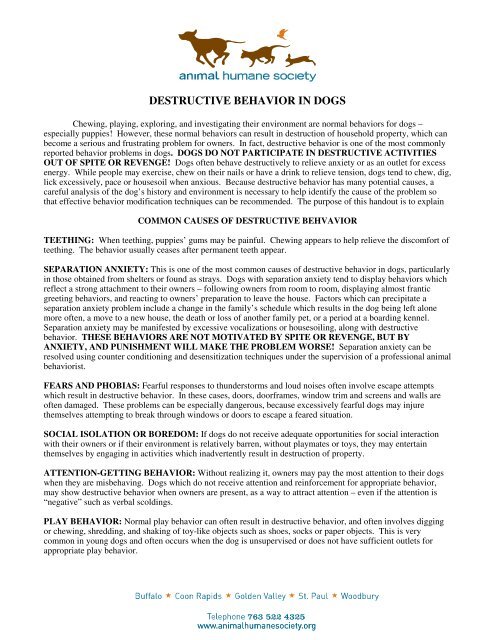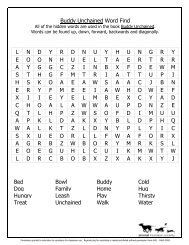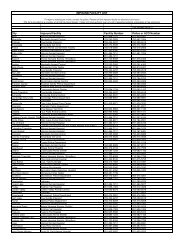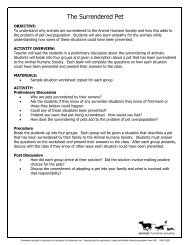DESTRUCTIVE BEHAVIOR IN DOGS - Animal Humane Society
DESTRUCTIVE BEHAVIOR IN DOGS - Animal Humane Society
DESTRUCTIVE BEHAVIOR IN DOGS - Animal Humane Society
You also want an ePaper? Increase the reach of your titles
YUMPU automatically turns print PDFs into web optimized ePapers that Google loves.
<strong>DESTRUCTIVE</strong> <strong>BEHAVIOR</strong> <strong>IN</strong> <strong>DOGS</strong><br />
Chewing, playing, exploring, and investigating their environment are normal behaviors for dogs –<br />
especially puppies! However, these normal behaviors can result in destruction of household property, which can<br />
become a serious and frustrating problem for owners. In fact, destructive behavior is one of the most commonly<br />
reported behavior problems in dogs. <strong>DOGS</strong> DO NOT PARTICIPATE <strong>IN</strong> <strong>DESTRUCTIVE</strong> ACTIVITIES<br />
OUT OF SPITE OR REVENGE! Dogs often behave destructively to relieve anxiety or as an outlet for excess<br />
energy. While people may exercise, chew on their nails or have a drink to relieve tension, dogs tend to chew, dig,<br />
lick excessively, pace or housesoil when anxious. Because destructive behavior has many potential causes, a<br />
careful analysis of the dog’s history and environment is necessary to help identify the cause of the problem so<br />
that effective behavior modification techniques can be recommended. The purpose of this handout is to explain<br />
COMMON CAUSES OF <strong>DESTRUCTIVE</strong> BEHVAVIOR<br />
TEETH<strong>IN</strong>G: When teething, puppies’ gums may be painful. Chewing appears to help relieve the discomfort of<br />
teething. The behavior usually ceases after permanent teeth appear.<br />
SEPARATION ANXIETY: This is one of the most common causes of destructive behavior in dogs, particularly<br />
in those obtained from shelters or found as strays. Dogs with separation anxiety tend to display behaviors which<br />
reflect a strong attachment to their owners – following owners from room to room, displaying almost frantic<br />
greeting behaviors, and reacting to owners’ preparation to leave the house. Factors which can precipitate a<br />
separation anxiety problem include a change in the family’s schedule which results in the dog being left alone<br />
more often, a move to a new house, the death or loss of another family pet, or a period at a boarding kennel.<br />
Separation anxiety may be manifested by excessive vocalizations or housesoiling, along with destructive<br />
behavior. THESE <strong>BEHAVIOR</strong>S ARE NOT MOTIVATED BY SPITE OR REVENGE, BUT BY<br />
ANXIETY, AND PUNISHMENT WILL MAKE THE PROBLEM WORSE! Separation anxiety can be<br />
resolved using counter conditioning and desensitization techniques under the supervision of a professional animal<br />
behaviorist.<br />
FEARS AND PHOBIAS: Fearful responses to thunderstorms and loud noises often involve escape attempts<br />
which result in destructive behavior. In these cases, doors, doorframes, window trim and screens and walls are<br />
often damaged. These problems can be especially dangerous, because excessively fearful dogs may injure<br />
themselves attempting to break through windows or doors to escape a feared situation.<br />
SOCIAL ISOLATION OR BOREDOM: If dogs do not receive adequate opportunities for social interaction<br />
with their owners or if their environment is relatively barren, without playmates or toys, they may entertain<br />
themselves by engaging in activities which inadvertently result in destruction of property.<br />
ATTENTION-GETT<strong>IN</strong>G <strong>BEHAVIOR</strong>: Without realizing it, owners may pay the most attention to their dogs<br />
when they are misbehaving. Dogs which do not receive attention and reinforcement for appropriate behavior,<br />
may show destructive behavior when owners are present, as a way to attract attention – even if the attention is<br />
“negative” such as verbal scoldings.<br />
PLAY <strong>BEHAVIOR</strong>: Normal play behavior can often result in destructive behavior, and often involves digging<br />
or chewing, shredding, and shaking of toy-like objects such as shoes, socks or paper objects. This is very<br />
common in young dogs and often occurs when the dog is unsupervised or does not have sufficient outlets for<br />
appropriate play behavior.
<strong>IN</strong>VESTIGATIVE <strong>BEHAVIOR</strong>: Dogs may inadvertently damage items in their environment when they are<br />
exploring or investigating. Dogs investigate objects by pawing at them and exploring them with their mouths.<br />
Many dogs, especially retrievers and young animals, also like to fetch and carry objects. Novel or unfamiliar<br />
objects are often damaged in this manner, especially when dogs are left unsupervised for long time periods.<br />
<strong>IN</strong>APPROPRIATE PUNISHMENT: Excessive punishment or punishment after the fact for any misbehavior<br />
may elicit anxiety associated with the presence of the owner. Thus, anticipation of the owner’s return or arrival<br />
increases the dog’s anxiety level, and may result in destructive behavior to relieve the anxiety.<br />
MEDICAL PROBLEMS: Upper gastrointestinal irritation, dental or gum pain may cause destructive chewing<br />
in adult dogs. Some diseases may cause excessive hunger (polyphagia), or eating of non-food items (pica).<br />
Consult your veterinarian if you suspect these problems.<br />
<strong>IN</strong>CONSISTENT FEED<strong>IN</strong>G ROUT<strong>IN</strong>ES: A hungry dog may go on a foraging spree, and destroy the house<br />
searching for food.<br />
BARRIER FRUSTRATIONS: Some dogs become anxious, and therefore destructive, when confined in small<br />
areas such as crates (flight kennels) or small rooms (bathroom, laundry room). This may be associated with<br />
separation anxiety.<br />
PREDATORY <strong>BEHAVIOR</strong>: If dogs are attempting to pursue rodents underneath floorboards or behind walls,<br />
destructive behavior may result.<br />
As you can see from this discussion, destructive behavior has many potential causes, and it should be clear why<br />
the cause of the behavior must be determined if the problem is to be dealt with effectively. Because destructive<br />
behavior is so common, it is reasonable to conclude that all dog owners should be prepared to lose something<br />
of value due to their dog’s destructive behavior! This is part of the experience of owning a dog! Certainly<br />
persistent and severe destructive behavior problems need to be resolved, for both the dog’s as well as the owner’s<br />
sake, but occasional destructive behavior should be put in perspective.<br />
Punishment alone rarely is effective in resolving destructive behavior problems and can make them worse.<br />
Punishment after the fact is NEVER appropriate. When punishment is indicated, the goal is NOT to punish the<br />
animal, but the behavior. This can never be accomplished with punishment after the fact. For assistance in<br />
resolving destructive and other behavior problems, contact a professional animal behaviorist, the Behavior Help<br />
Line at the AHS at 763-489-2202.<br />
Written by Suzanne Hetts, Ph.D. Certified Applied <strong>Animal</strong> Behaviorist,<br />
Denver Dumb Friends League (<strong>Humane</strong> <strong>Society</strong> of Denver)<br />
IF THIS MATERIAL IS REPRODUCED THE AUTHOR AND DDFL MUST BE CREDITED


